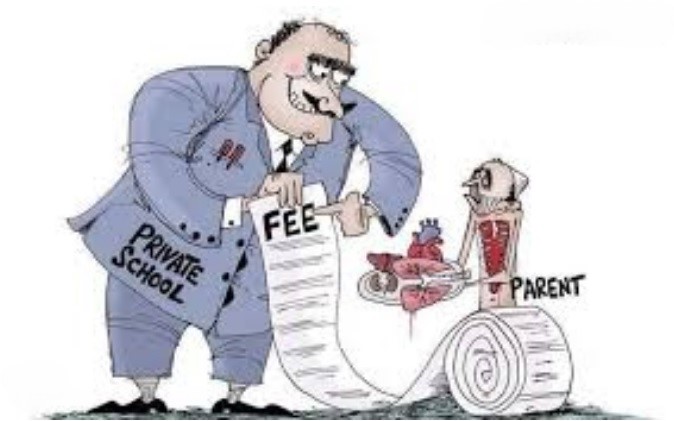The Crushing Weight of Education in Kashmir
By: Javid Amin
Srinagar 06 May 2025: In the picturesque valleys of Kashmir, where snow-capped mountains meet vibrant saffron fields, a silent crisis is unfolding. For thousands of families, education—a fundamental right enshrined in India’s Constitution—has morphed into a relentless financial burden. Private schools, once seen as gateways to opportunity, now stand accused of exploiting parents through unregulated fee hikes, hidden charges, and punitive policies that target vulnerable students. This article delves into the layers of this crisis, from its economic roots to its psychological scars, and explores actionable solutions to reclaim education as a right, not a privilege.
01: The Escalating Cost of Education – A Deep Dive
1.1 Skyrocketing Tuition Fees: A Crisis Without Justification
Private schools in Kashmir have increased tuition fees by 40-60% over the past five years, far outpacing inflation rates (which average 5-6% annually). Parents report annual hikes of ₹10,000–₹20,000 per child, with no correlation to improved infrastructure or academic quality. For instance, a Srinagar-based school raised fees by 55% in 2023, citing “operational costs,” yet classrooms lack basic heating systems for harsh winters.
Case Study:
The Khan Family (Baramulla District)
-
-
Income: ₹25,000/month (combined)
-
School Fees: ₹12,000/month for two children (48% of income)
-
Sacrifices: Skipped medical treatments, sold jewelry, and borrowed from relatives.
-
Key Questions:
-
-
Why are schools not required to disclose financial audits?
-
How can middle-class families survive such unchecked exploitation?
-
1.2 Hidden Costs: The Invisible Tax on Parents
Beyond tuition, families face a maze of arbitrary charges:
a) Building Funds:
-
-
Schools demand ₹5,000–₹10,000 annually for “infrastructure upgrades,” yet parents see no renovations. In Pulwama, a school collected ₹8 lakhs in 2022 for a “new library” that remains unbuilt.
-
b) Annual Maintenance Charges:
-
-
Fees of ₹3,000–₹7,000 are levied without transparency. A 2023 survey found 78% of parents had no idea how these funds were utilized.
-
c) Late Payment Penalties:
-
-
Schools impose fines of ₹500–₹1,000 per day for delayed fees, leading to student suspensions. In Anantnag, a Class 8 student was barred from exams over a 3-day delay.
-
d) Uniform and Book Monopolies:
-
-
Schools force parents to buy supplies from specific vendors at inflated prices. A branded uniform costs ₹2,500 vs. ₹800 in local markets.
-
e) Mandatory Transport Fees:
-
-
Non-users still pay ₹1,500–₹2,000/month. “Why pay for buses we don’t use?” asks a Kupwara parent.
-
1.3 Sacrifices Made by Families: Education vs. Survival
-
-
Loan Burdens: 62% of families have taken loans (source: J&K Education Survey 2023).
-
Downgrading Schools: Many shift children to underfunded government schools, where student-teacher ratios exceed 50:1.
-
Health Compromises: 34% of parents delay medical care to afford fees.
-
Quote from a Parent: “We’re choosing between our children’s future and today’s meals.” – Rafiq Ahmed, Srinagar
02: The Psychological Warfare on Students
2.1 Punishment for Poverty: Humiliation as Policy
-
-
Attendance Tampering: Schools mark fee-defaulting students “absent,” risking academic disqualification. A Class 10 student in Budgam missed board exam eligibility due to 15 “absences” linked to fee delays.
-
Social Isolation: Children are forced to sit separately, amplifying stigma. “My daughter cries every morning,” shares a Ganderbal mother.
-
Homework Denial: Teachers withhold study materials, leaving students unprepared for exams.
-
2.2 Academic Pressure and Mental Health
-
-
Stress-Induced Dropouts: 22% of students in private schools show anxiety symptoms (per Srinagar Child Welfare Board).
-
Long-Term Trauma: Psychologist Dr. Ayesha Mir warns, “Public shaming breeds lifelong insecurity and resentment.”
-
Real-Life Impact:
-
-
Sara (14, Srinagar): Developed panic attacks after being ridiculed for unpaid fees.
-
Arif (16, Sopore): Scored 98% in Class 10 but now skips school to avoid humiliation.
-
03: Systemic Failure – Where is the Government?
3.1 Weak Enforcement of Education Laws
-
-
Right to Education (RTE) Act, 2009: Mandates fee regulation but lacks enforcement in J&K.
-
J&K School Education Act, 2002: Allows private schools to set fees autonomously, creating loopholes for exploitation.
-
Government Inaction:
-
-
Only 12% of complaints to the Education Department received responses in 2023.
-
Conflict of Interest: Many officials have ties to private school associations.
-
3.2 Parental Rights vs. Institutional Power
-
-
Legal Recourse: Parents can file cases under Section 13 of the RTE Act, but the process is slow and costly.
-
Grassroots Movements: The Kashmir Parents’ Collective (KPC) has staged protests, but police often disperse gatherings.
-
Demands for Reform:
-
-
Cap annual fee hikes at 5%.
-
Mandatory public audits of school finances.
-
Fast-track courts for education disputes.
-
04: Solutions – A Collective Fight for Justice
4.1 Empowering Parents
-
-
Form Associations: Unified voices attract media and political attention. The KPC successfully pressured 15 schools to reverse hikes in 2023.
-
Social Media Advocacy: Hashtags like #EducationForAllKashmir trended with 50k+ tweets in March 2024.
-
Document and Report: Use apps like Shiksha Saathi to log grievances and share evidence with NGOs.
-
4.2 Government Accountability
-
-
Policy Overhaul: Adopt models like Kerala’s Fee Regulatory Committee, which slashed unjust hikes by 30%.
-
Transparency Portals: Publish school fee structures and penalty policies online.
-
Subsidies for Low-Income Families: Allocate funds from Jammu & Kashmir’s education budget (currently ₹11,000 crore).
-
Bottom-Line: Reclaiming Education – A Call to Action
Kashmir’s children deserve schools that nurture, not punish. The path forward requires:
-
Immediate Government Intervention: Enforce fee caps and penalize exploitative schools.
-
Community Solidarity: Parents, NGOs, and educators must unite.
-
Global Awareness: Share stories to mobilize national and international support.
Final Quote: “Education is the passport to the future. Let’s ensure every Kashmiri child gets theirs.”



